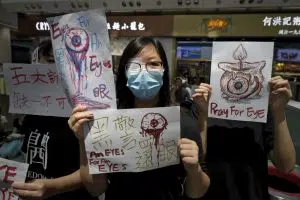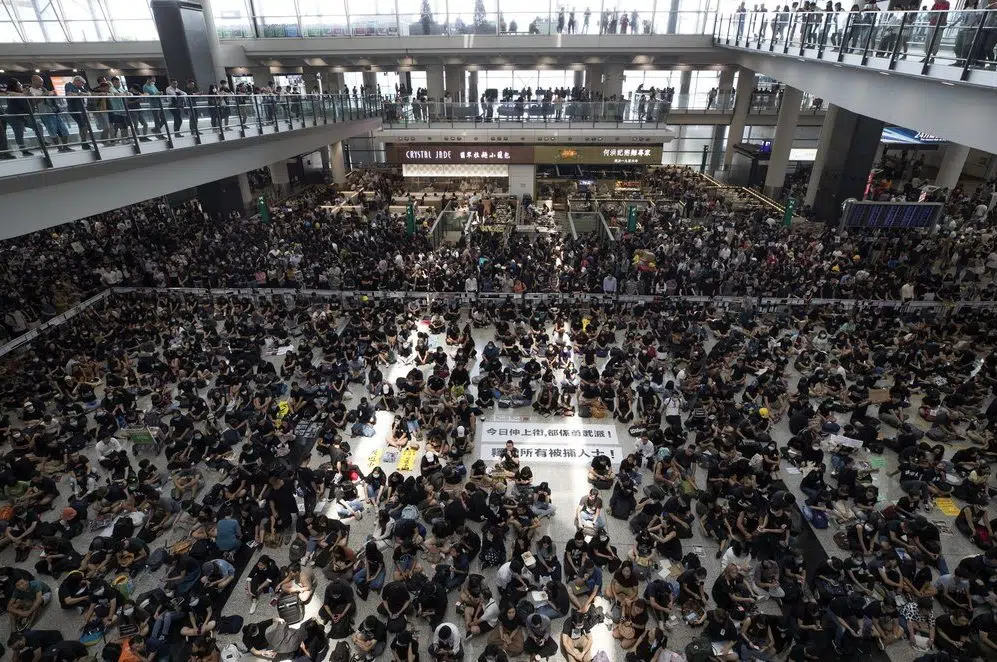HONG KONG – One of the world’s busiest airports cancelled all flights after thousands of Hong Kong pro-democracy protesters crowded into the main terminal Monday afternoon.
Hong Kong International Airport said in a statement that the demonstration “seriously disrupted” airport operations.
Hong Kong has experienced more than two months of mass protests calling for democratic reforms and an independent inquiry into police conduct, with both the protesters and police adopting ever-more extreme tactics.
In Beijing, the Cabinet’s Hong Kong and Macao Affairs Office issued a statement saying the situation in Hong Kong was “beginning to show the sprouts of terrorism” and constituted an “existential threat” to the population of Hong Kong.
“One must take resolute action toward this violent criminality, showing no leniency or mercy,” said the statement, attributed to spokesman Yang Guang. “Hong Kong has reached an inflection point where all those who are concerned about Hong Kong’s future must say ‘no,’ to law breakers and ‘no’ to those engaged in violence.”
Only flights that had already begun boarding or those cleared for landing were allowed to use runways at the airport.
“All other flights have been cancelled for the rest of today,” the airport statement said.
A massive traffic jam soon formed on the highway leading back to Hong Kong’s city centre. Some protesters were seen walking toward the airport amid the stifling heat.
Earlier Monday, Hong Kong police showed off water cannons that could be deployed in the case of future demonstrations, a development which Amnesty International has warned could lead to serious injuries if misused within the densely-populated city’s confined spaces.
Legislators and journalists were invited to witness the display of extreme crowd control tactics, which came after a weekend of protests at the airport and on the streets of one of the city’s main shopping districts.

People hold signs which read ” Black Police, Return eye,” bottom center, during a protest at the arrival hall of the Hong Kong International airport in Hong Kong, Monday, Aug. 12, 2019. It is reported that police shot a woman in the eye with a projectile Sunday night during confrontations between protesters and police. (AP Photo/Vincent Thian)
During the weekend protests, website Hong Kong Free Press showed footage of one arrest that appeared to include officers in plain clothes pinning a demonstrator pressed to the ground. The young man, who said his name was Chow Ka-lok and asked for a lawyer, was shown with a bleeding head wound and said he had a broken tooth.
Police have also reported injuries among their ranks, including eye irritation from laser pointers, burns from petrol bombs and bruises and cuts from flying .
Protesters hurled bricks at officers and ignored warnings to leave before tear gas was deployed in the Sham Shui Po area, police said, calling a march there an “unauthorized assembly.”
Tear gas was also deployed in central Hong Kong on both sides of Victoria Harbour, in the Tsim Sha Tsui area on the Kowloon side and in Wan Chai on Hong Kong Island. At one point, protesters blocked the entrance to a plaza to prevent police from entering.
A train station in Kwai Fong filled with smoke after about a dozen police officers fired tear gas inside. It was not clear how many protesters were inside the station at the time, but it has been rare for officers to fire tear gas indoors.
Earlier, a large group of mostly young protesters marched down the middle of Hennessey Road, a main shopping drag in the Causeway Bay area, as a rally was held in nearby Victoria Park. Many wore face masks to shield their identities, and a few had helmets. Others just carried backpacks over the black T-shirts that have become their uniform.
The protest movement’s demands include the resignation of the Chinese territory’s leader, Carrie Lam, democratic elections for her successor, the release of those arrested in earlier protests and an investigation into police use of force.
A former British colony, Hong Kong was returned to China in 1997 under the principle of “one country, two systems,” which promises the city certain democratic rights not afforded to people on the mainland. But in recent years, some have accused the Communist Party-ruled central government of steadily chipping away at their freedoms.
Banners at the rally in Victoria Park read “Give Hong Kong back to us” and “Withdraw the evil law,” the latter a reference to an extradition bill that was the original spark for the protests. A large crowd sat under umbrellas, which are both a protest symbol in Hong Kong and protection from the summer heat.
At the airport, a flight attendant protesting on his day off, who gave only his surname, Lau, to avoid repercussions from his employer, said heavy-handed police tactics had alienated some people.
“The police have told a lot of lies to Hong Kong people. We cannot believe them anymore. We have to come here to protest,” Lau said. China has reportedly threatened to bar air crew who take part in protests from its air space.
Another protester, who identified herself only as Bea, said she took the day off from work to express her outrage.
“I feel that I have to do something. … It’s just too sad to see what has happened. The police action has gone totally nonsensical,” she said.
Yanan Wang, The Associated Press







